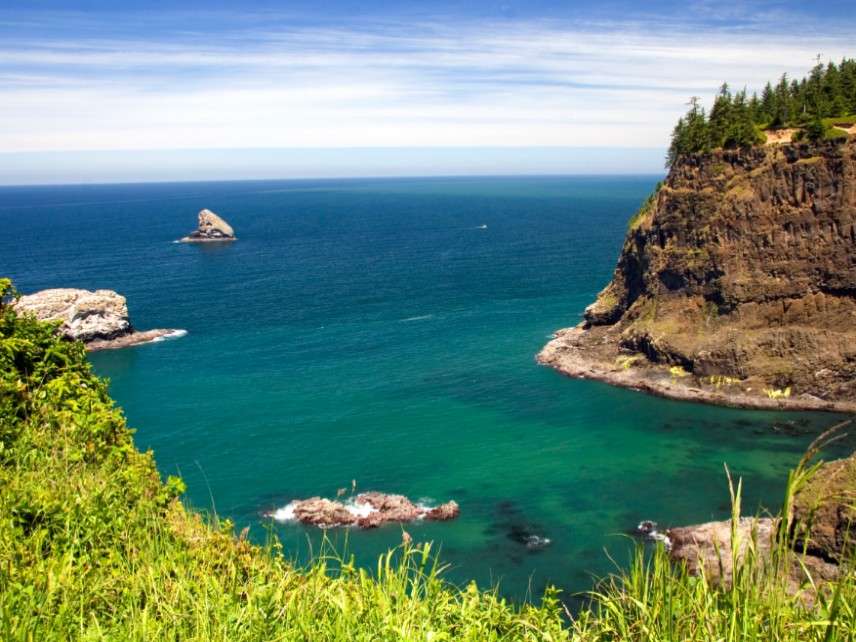Oregon Oysterman's Poop Problem Shows Need for Market-Based Regulations
If we want fresh oysters, good cheeses, and clean water, we should rethink how we regulate all three.

An Oregon oysterman has sued state environmental regulators over pollution he says comes from dairy farms around his Tillamook Bay oyster beds. Oyster farmer Jesse Hayes says that fecal runoff from the farm is impacting his oyster harvests, and that the state has failed to protect him, his business, and the bay.
Hayes is suing the state, rather than any particular farmer or farmers, because it would be difficult or impossible to identify the specific farms where the fecal contamination originates.
The state countered, unsympathetically, that Hayes should have commented on regulations it established in 2001 before they were finalized. But a state court rejected the state's arguments last week, determining that Hayes's suit may proceed because the state failed to sign the regulations in 2001, making them merely a draft order.
Hayes's suit is set to go to trial next week. Hayes attorney says that if he loses the case, he'll sue the state agriculture department, seeking to crack down on the confined animal feeding operations (CAFOs) he believes are responsible for the contamination.
This case raises several interesting issues. For one, it pits one category of food producer (oyster farmers) against another (livestock farmers). It also shows how regulations from one agency (here, environmental quality) may come into or create conflict with those of another (agriculture). And, while people have been quick to criticize current EPA leadership, for example, for being in bed with the industries that agency regulates, the Oregon suit shows environmental regulators in blue states may evidence exactly the same sort of capture.
As for the poop problems Hayes alleges, manure from livestock enters waterways as runoff, typically carried from farmers' fields—where it's used as fertilizer—by rain. Such problems aren't confined to Oregon. They're national and even international in scope. Similar issues exist in waters where agricultural runoff concentrates, particularly in the United States but also in Europe.
One classic example of runoff from livestock impacting shellfisheries comes from Maryland, where the state's large poultry and crabbing industries have battled over runoff for decades. A decade ago, the New York Times reported that Maryland's poultry industry produced 650 million pounds of chicken manure every year. A 2016 article suggests that number had since doubled. Yet pollution levels are down in the Chesapeake Bay. State taxpayers are now footing part of the bill to send chicken poop out of state, which the Baltimore Sun reports benefits both poultry producers and the Chesapeake Bay.
Another example is the so-called "dead zone" in the Gulf of Mexico, which extends out from the mouth of the Mississippi River and is caused by farm runoff all the way down the river from its source in Minnesota, and has been described as similar in size to the state of New Jersey. A 2017 McClatchy article on oyster farming in Washington State put it bluntly: "There's just too much poop in the waters of Puget Sound."
Similar battles have pitted livestock farmers against oyster farmers in Tomales Bay, California. Fecal runoff from dairy farmers caused oyster harvests there to plummet in 2004, the L.A. Times reported, due in part to regulations designed to mitigate the impact of fecal runoff from dairy farms around the bay, which required oyster farmers to wait at least four days after any significant rain to harvest oysters. This was all despite the fact many dairy farmers had implemented a variety of plans to reduce runoff from their farms.
Other methods of transmission are also possible. In North Carolina, the recent hurricane, Florence, caused large pig-waste lagoons from the state's pork industry to overflow, spurring a smelly and potentially hazardous mess that's polluted waterways and neighboring property in the state.
Considering the breadth and frequency of these issues, it's clear current regulations aren't working for those who earn their livelihoods farming on land and sea. They're not working for the environment nor consumers, either.
Are stricter regulations the answer? I'm not sure that's the case. It's difficult to envision a top-down regulatory structure they can benefit or even balance the oftentimes-competing interests of oyster farmers and livestock farmers, consumers, and the environment.
If regulations haven't kept farmers, consumers, and environmentalists happy, and more stringent regulations are unlikely to ameliorate the problems, maybe it's time to consider broader adoption of some market-based options. These might include Pigouvian taxes, Coasean bargaining, polluter credits—which enable "farmers and manufacturers to buy and sell 'credits' they have earned by reducing their own pollution"—or some combination. If we want fresh oysters and good cheese and clean water—I, for one, want all three—then we should think and regulate differently.


Show Comments (122)